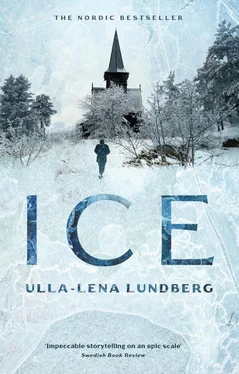Then the pastor notices that no one from the Coast Guard is at church today. It’s starting to get light outside, and a couple of boys who’ve been up on a hill having a look around come back to tell them that both Coast Guard boats are gone, obviously to take part in the rescue mission along with the military from the base on Utö. They must have been called out during the night, over the radio. “Good Lord, you’ve got to have guts to go out in a small boat in this weather,” someone says. Brage’s parents and wife are in the church but didn’t know he’d gone out. He was on duty at the station and celebrated Christmas there. “First Christmas pike at home and then Christmas ham at the station, because Björklund’s from the mainland and pike won’t do,” Astrid explains. She doesn’t seem particularly worried. It’s another thing the pastor admires in his parishioners— their fatalism. What happens is what’s meant to happen.
Definitely light outside now, grey on grey, black where the sides of the hills are whipped with rain. Icy cold. Mona can guess that there will be a lot of visitors during the day and hurries home with the girls. They have to sit in the kitchen while she gets a fire burning in the range and puts pots of water on the rings. Then she quickly builds fires in the tile stoves and manages to measure out the coffee and slice the bread before the first of them arrive. First they have to count the collection and make certain every candle is out. The verger goes down to the boiler room two extra times to make sure that no coals are smouldering and that the insulation is not smoking anywhere. The radiators have started to go cold, but you never know, and the pastor promises to check again at dinner time.
No one really wants to go home, except Anders, who left in a rush, and by and by the pastor, the organist, the verger, Elis and Adele, and several men from the west villages, who are hoping the pastor’s phone is less dead than other people’s, head for the parsonage. There’s a lovely warmth coming from the tile stoves and the open oven door, and they all crowd around the kitchen table and pass around chicory coffee and bread and butter and slices of Christmas ham. “Such luxury!” Adele says about the ham, and the pastor’s wife thinks the same thought as, mournfully, she watches the disappearance of the ham, which would have lasted them three more days. But she comes from a farm herself, and she knows there’s nothing worse than having a reputation for stinginess and lack of hospitality.
Several of them crank the telephone energetically and fiddle with the radio, and in the midst of the static and the hissing they suddenly hear a clear voice from Finnish Radio talking about the Christmas Eve tragedy, the American freighter Park Victory , that sank off Utö. The U.S. Embassy conveys its gratitude to the pilots on Utö for their heroic rescue efforts. The Embassy has arranged for the survivors to be taken to Helsingfors, where they will be housed until they can travel home. The pilots have rescued fourteen men. Eight bodies have been recovered and two are missing and presumed dead.
The men look out the window. “With this wind, they’ll be coming here,” they predict, and it takes half a second for the pastor to grasp that they mean the two missing crew members, whose bodies will be driven towards the Örlands by the wind and the currents. That’s why they figure the Coast Guard from the Örlands is still out. They’re moving slowly, with the wind, and searching the whole way. Nevertheless, they come home empty-handed, and it’s Post-Anton who finds one of the bodies shortly after New Year’s.

Much can happen to a body that winds up in the water in a storm. You can figure the direction roughly, but you also have to reckon with currents which, in places, can move in the opposite direction to the wind and carry you on great detours. Then, when you start to approach a coastline, you have to deal not only with the current among the islands but also with reefs and rocks that you rub against and have to work your way around before you can move on. In amongst the skerries, the wind trundles around any way it likes, and if you’re a corpse at its mercy, you can end up in odd places.
I thought it was a seal, I did. But when it didn’t move, even though I came so close that it should have caught my scent, since I was upwind, I realized it was a man who’d washed up on the rocks like a big bull seal. A lifebelt and dark clothes, there’s no big difference between seamen and old bull seals.
It was a Negro. Not as black as I’d thought they were but more grey, maybe they lose some of their colour when they die. Otherwise just like a human being. A cap with earflaps so I couldn’t tell if he had woolly hair like they say Negroes have. Oilskins and good shoes on his feet. I wondered if I should try to pull him into the boat, but he was heavy as hell, and postal boats are supposed to carry the mail, not dead seamen. So I just pulled him up a little more so he wouldn’t drift away, and then I stopped by the Coast Guard and told them where he was, and then home with the mail.
“How did you happen to find him?” they asked, of course. “Those rocks aren’t on your usual route.”
“Well, no,” I said. “But I saw which way I should steer.”
Brage knows what I mean. But Björklund was irritated. “What do you mean, you knew which way to steer?” he said. “If you can tell us where the other one is too, then we can stop searching.”
“No,” I said. “If he’s caught on something and is on the bottom, or inside the wreck, for example, then I can’t see anything. Any fool knows that.”
This is the darkest time of the year, and there’s a lot of movement in the water, storms and currents. These are hard trips for me, even though I go only twice a week. That Christmas night I slept like a dead man. All the light was knocked out of me, I didn’t know a thing. Not a dream, not a sound could have woken me. In my sleep there was only the storm thundering away, while I lay deep down in my furs, dry and out of danger.
If I had been awake and able to hear and see, what could I have done, even with a thousand signs? There were a lot of people who did have them. The pastor himself said he was up wandering around the house and heard all sorts of things. The one who should have heard and seen was the captain of the Park Victory. They were waiting for a pilot, and the bridge was fully manned. Their radio was on, calling and crackling, which makes it hard to hear anything else, hard to figure out why there’s such an urgent unease in the pit of your stomach and where your fears are coming from. Do they carry a message, or are you just suffering fearful premonitions in the terrible storm? The pilots said that they tried to call on the radio and tell them to move farther offshore, but others who were out that night said they could hardly hear anything, mostly just occasional words, many of them Russian, so chopped to pieces they were impossible to understand. The engines pound and roar and the props thrash and whip. In that kind of hell, it’s not easy to grasp that there are spirits out there who are trying to get you to see how you can save yourself.
I have the greatest admiration for the pilots. When they are dead and gone, they’ll be out there too, that I know, and anyone with ears and senses will be safe. They were ready to sacrifice their lives, it says in the newspapers, but let me tell you that they knew exactly what to do to save themselves and still rescue as many as possible. You need one man to manage the engine and the rudder, and he needs a voice that can be heard and eyes that can see. And then you need men who know precisely to the tenth of a second when to fend off and which wave to turn on. That they managed to rescue so many in two little pilot boats, I respect them for that. More boats came out later from the military on Utö, but without the pilots they would have pulled out maybe three or four still alive. They all had lifebelts, but there’s a horrific power in the waves, and it was indescribably cold. Those who drifted in towards land were dashed to death on the rocks.
Читать дальше













